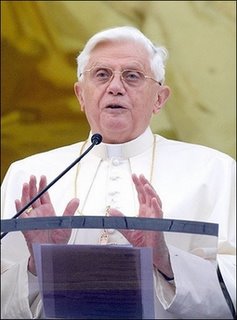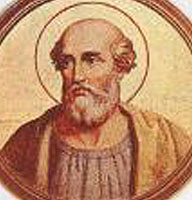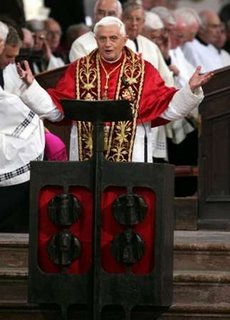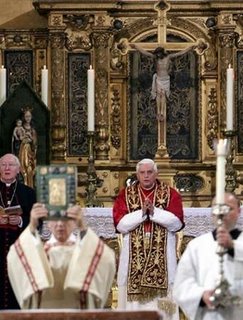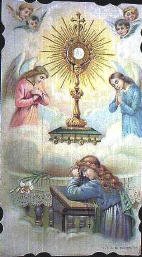
I hope all of my readers have enjoyed all of the posts on the writings of St. John Vianney. This is my final post on it - the 37th post. And I am very proud to end on his writting entitled "Catechism on Communion". After all, Jesus is truly and really present - body, blood, soul, and divinity - in the Holy Eucharist. We are to adore Him in the Eucharist. We are to receive Him, while in grace, in the Eucharist. And for those that deny such a beautiful gift spoken of in the Gospel of John Chapter 6 by Jesus Himself, pray for such doubters. The Eucharist is one of the two pillars of salvation.
Catechism on Communion:
To sustain the soul in the pilgrimage of life, God looked over creation, and found nothing that was worthy of it. He then turned to Himself, and resolved to give Himself. O my soul, how great thou art, since nothing less than God can satisfy thee! The food of the soul is the Body and Blood of God! Oh, admirable Food! If we considered it, it would make us lose ourselves in that abyss of love for all eternity! How happy are the pure souls that have the happiness of being united to Our Lord by Communion! They will shine like beautiful diamonds in Heaven, because God will be seen in them.
Our Lord has said, Whatever you shall ask the Father in My name, He will give it you. We should never have thought of asking of God His own Son. But God has done what man could not have imagined. What man cannot express nor conceive, and what he never would have dared to desire, God in His love has said, has conceived, and has executed. Should we ever have dared to ask of God to put His Son to death for us, to give us His Flesh to eat and His Blood to drink? If all this were not true, then man might have imagined things that God cannot do; he would have gone further than God in inventions of love! That is impossible. Without the Holy Eucharist there would be no happiness in this world; life would be insupportable. When we receive Holy Communion, we receive our joy and our happiness. The good God, wishing to give Himself to us in the Sacrament of His love, gave us a vast and great desire, which He alone can satisfy. In the presence of this beautiful Sacrament, we are like a person dying of thirst by the side of a river -- he would only need to bend his head; like a person still remaining poor, close to a great treasure -- he need only stretch out his hand. He who communicates loses himself in God like a drop of water in the ocean. They can no more be separated.
At the Day of Judgment we shall see the Flesh of Our Lord shine through the glorified body of those who have received Him worthily on earth, as we see gold shine in copper, or silver in lead. When we have just communicated, if we were asked, "What are you carrying away to your home?" we might answer, "I am carrying away Heaven. " A saint said that we were Christ-bearers. It is very true; but we have not enough faith. We do not comprehend our dignity. When we leave the holy banquet, we are as happy as the Wise Men would have been, if they could have carried away the Infant Jesus. Take a vessel full of liquor, and cork it well -- you will keep the liquor as long as you please. So if you were to keep Our Lord well and recollectedly, after Communion, you would long feel that devouring fire which would inspire your heart with an inclination to good and a repugnance to evil. When we have the good God in our heart, it ought to be very burning. The heart of the disciples of Emmaus burnt within them from merely listening to His voice.
I do not like people to begin to read directly when they come from the holy table. Oh no! what is the use of the words of men when God is speaking? We must do as one who is very curious, and listens at the door. We must listen to all that God says at the door of our heart. When you have received Our Lord, you feel your soul purified, because it bathes itself in the love of God. When we go to Holy Communion, we feel something extraordinary, a comfort which pervades the whole body, and penetrates to the extremities. What is this comfort? It is Our Lord, who communicates Himself to all parts of our bodies, and makes them thrill. We are obliged to say, like Saint John, "It is the Lord!" Those who feel absolutely nothing are very much to be pitied.
Read more on St. John Vianney



